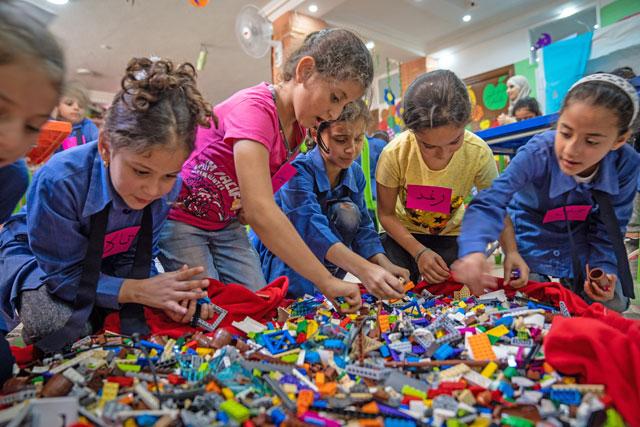You are here
UNICEF concentrating its resources at 220 centres for Syrian, Jordanian children
By Muath Freij - Mar 16,2015 - Last updated at Mar 16,2015

SUKHNEH – After witnessing the violence in their hometown of Daraa in Syria, Sahar Yaseen’s children did not dare go out alone and socialise with others.
Yaseen, who has been in Jordan for two years, said the sound of bombs her children used to hear every day had a severe psychological impact and discouraged them from meeting new people.
But once in Jordan, she started visiting a social centre in the town of Sukhneh in Zarqa, where her two boys started opening up to the world.
“My children got better when they started going to the centre and socialising with others. They used to be afraid of going out alone and now they have the courage to meet new friends,” she told The Jordan Times in an interview at the centre.
Yaseen is among several Syrian and Jordanian families who benefit from the services of Sukhneh centre, supported by UNICEF.
Around 150 Syrian families are residing in the area and they all benefit from the centre’s services, according to its officials.
It is one of the centres that are going to be covered by UNICEF’s Makani (My place) initiative.
Makani aims to reach 90,000 boys and girls in Jordan who are excluded from any form of education and are exposed to high risks of child labour, exploitation and early marriage, according to a UNICEF statement.
During the past years, the UN agency used to operate many centres around Jordan, which was rather costly, according to UNICEF communications specialist Samir Badran.
“Because of the lack of financial support, UNICEF decided to put together all its services at specific centres,” Badran told The Jordan Times.
UNICEF has received only $32 million of the $179 million it requires to meet the needs of children in Jordan, Lucio Melandri, UNICEF humanitarian affairs specialist, said last week.
Badran noted that UNICEF plans to provide support for 220 centres all over the Kingdom by the end of this year where children can receive comprehensive services including psychosocial support and education.
“These centres will benefit the local community and other children of different nationalities,” the UNICEF official added and around 50 centres have been supported so far under Makani.
Most of the targeted centres are located in the northern region since most refugees are concentrated there, Badran said, adding that other centres in the central and southern regions will also benefit from this initiative.
“These centres are gathering points for Syrians and Jordanians and they help break the ice between them,” he noted.
Activities under the Makani programme are currently funded by Canada, the EU, Germany, Korea International Cooperation Agency, the Netherlands and UKAid, according to UNICEF.
Related Articles
AMMAN — UNICEF has no financial difficulties for now in accommodating all school-age Syrian refugees in Jordan in formal education, but the
AMMAN — Children from the UNICEF-supported Makani centre in Baqaa on Tuesday were visited by French Ambassador to Jordan David Bertolotti, t
AMMAN — UNICEF and the LEGO Foundation recently teamed up to distribute thousands of boxes of LEGO to schools, kindergartens and Makani cent

















